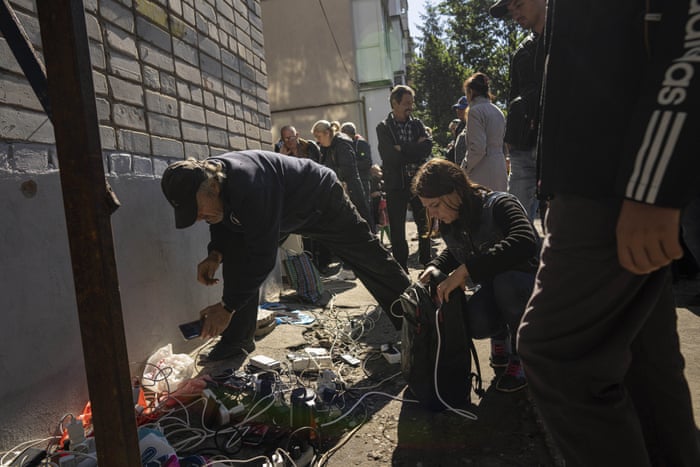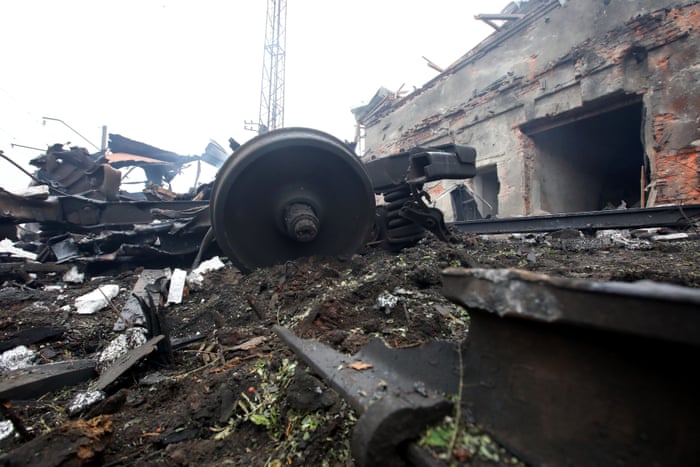Key events
Traffic arriving at Finland’s eastern border with Russia has “intensified” during the night, the Finnish border guard said early on Thursday, while adding that the situation was under control.
Reuters reports that Finnish border guard’s head of international affairs, Matti Pitkaniitty, said: “The number clearly has picked up.”
“It is an exceptional number in the sense that it clearly is busier,” he said, adding that the situation was under control and border guards were ready at nine checkpoints.
Conservative MP Tobias Ellwood, who is chair of the house of commons defence committee in the British parliament, has been interviewed on Sky News this morning in the UK. He has been a strong proponent of more direct action and support from Nato for Ukraine, since Russia’s latest invasion began. He told viewers:
I think our leaders are now recognising where this is all going and we need to step back and ask ourselves the fundamental security question that I pose ever more regularly. Is the world likely to become more dangerous or less over the next few years? I think the answer is clearly the former.
This is not just about Ukraine, but the emergence of a new alliance with Russia, China, and other authoritarian states challenging the status quo that we’ve enjoyed since the end of the cold war. So our actions now, in how we handle Ukraine, given the conflict has now moved into a darker chapter, will determine I think how the next decade plays.
He said:
We’re involved in an economic war with Russia over oil, over gas, over energy. We’re training Ukrainians to fight, we’re arming them with other sophisticated weapons. We’re involved in a political war with Russia.
We need to recognise that we need to move to a war footing, and how we protect our energy supplies, how we develop greater resilience to thwart expected grey zone attacks, how we procure and replace weapons systems that we’ve gifted – our cupboards are almost empty – and how we better assist vulnerable states such as such as Moldova.
Specifically on the issue of the use of nuclear weapons, Ellwood expressed concern that Nato did not have a properly formulated doctrine, saying:
We need to recognise we need to have proportionate responses if nuclear weapons are used, or indeed chemical weapons. We need robust protocols in place in case a tactical low yield nuclear weapon is used. When I visited Nato I asked this very question, and there wasn’t an answer. We need to be very, very clear if Putin steps over this threshold what the west will do.
Kirill Stremousov, part of the Russian-imposed administration in occupied Kherson, has posted to Telegram ahead of the planned referendum in the region at the weekend. He has said:
Residents of the Kherson region expect real statehood from Russia. After all, in recent years Ukraine has been turned into a colony according to the principles of the tribal system. Nazism was literally brought to the inhabitants of Ukraine in the open, we were forbidden to speak our native Russian language, “history” was being rewritten before our very eyes. We want the development of our Kherson region, and not allow our region to be robbed by “our European partners.” Residents of the Kherson region deserve respect and development opportunities. And this can only be done with Russia, but it will be a completely different story, country …
Here are some of the latest images sent to us over the newswires from Ukraine.


Vitaliy Kim, the governor of Mykolaiv, has posted a lengthy status update to Telegram detailing damage from a large number of strikes across the region.
He says in the city of Mykolaiv itself “massive rocket fire” just after midnight led to “multi-story buildings were damaged, windows were broken, gas pipelines, water pipes, cinema and theatre courtyards, administrative buildings were damaged.”
However, there appear to be no casualties or deaths as a result of the strikes. The claims have not been independently verified.
The Russian foreign ministry spokeswoman Maria Zakharova has, according to Russia’s RIA news agency, described Joe Biden’s speech at the UN as “indecent”, and accused the US president of mis-quoting his Russian counterpart, Vladimir Putin. RIA quotes Zakharova saying:
As for the speech of the president of the United States, I consider it absolutely indecent how it began. Indecent not because they have nothing to do or they do not have the right to touch other countries. The fact is that he allegedly started quoting the president of Russia. We, as we always do, began to double-check Biden’s words. Biden said it for sure, but the president of Russia did not say that.
She described the way that Putin’s words were being portrayed by Biden and the US media as “absolutely propaganda” and “contrary to what was actually said”.
Here is how Joe Biden opened his speech in the UN, saying:
Let us speak plainly. A permanent member of the United Nations security council invaded its neighbour, attempted to erase a sovereign state from the map.
Russia has shamelessly violated the core tenets of the United Nations charter – no more important than the clear prohibition against countries taking the territory of their neighbour by force.
Again, just today, President Putin has made overt nuclear threats against Europe and a reckless disregard for the responsibilities of the non-proliferation regime.
Later in his speech he also said:
Russia shunned the non-proliferation ideals embraced by every other nation at the 10th NPT review conference. And again, today, as I said, they’re making irresponsible nuclear threats to use nuclear weapons.
Here is the passage, in translation, from Vladimir Putin’s speech on Tuesday where he mentioned nuclear blackmail and nuclear weapons:
Nuclear blackmail was also launched. We are talking not only about the shelling of the Zaporizhzhia nuclear power plant, which is encouraged by the west, which threatens a nuclear catastrophe, but also about the statements of some high-ranking representatives of the leading Nato states about the possibility and admissibility of using weapons of mass destruction against Russia – nuclear weapons.
For those who allow themselves to make such statements about Russia, I would like to remind you that our country also has various means of destruction, and for some components more modern than those of the Nato countries.
And if the territorial integrity of our country is threatened, we will certainly use all the means at our disposal to protect Russia and our people. This is not a bluff. And those who try to blackmail us with nuclear weapons should know that the weathervane can turn and point towards them.
The US ambassador to Ukraine, Bridget Brink, has said her thoughts are with the recently released prisoners of war and their families. She tweeted:
My thoughts this morning are with the released POWs, and with their loved ones. Thank you to President Zelenskiy and his team for including all prisoners of war, including two US citizens, who will be reunited with their families, in negotiations.
My thoughts this morning are with the released POWs, and with their loved ones. Thank you to President Zelenskyy and his team for including all prisoners of war, including two U.S. citizens who will be reunited with their families, in negotiations. https://t.co/ivGIrJE4NV
— Ambassador Bridget A. Brink (@USAmbKyiv) September 22, 2022
Alexander Drueke and Andy Tai Huynh, both US military veterans from Alabama who had volunteered to fight, were released yesterday. Drueke’s aunt, Dianna Shaw, said the two men were “safely in the custody of the US embassy in Saudi Arabia and after medical checks and debriefing they will return to the states”.
UK MoD: mobilisation is ‘admission Russia exhausted supply of willing volunteers’
The UK’s ministry of defence has issued its daily intelligence briefing about how it sees the situation in Ukraine. It has concentrated today on the consequences of Russia’s partial mobilisation announced yesterday by Vladimir Putin, which it judges unlikely to be effective. It writes:
Russia is likely to struggle with the logistical and administrative challenges of even mustering the 300,000 personnel. It will probably attempt to stand up new formations with many of these troops, which are unlikely to be combat effective for months.
Even this limited mobilisation is likely to be highly unpopular with parts of the Russian population. Putin is accepting considerable political risk in the hope of generating much needed combat power.
The move is effectively an admission that Russia has exhausted its supply of willing volunteers to fight in Ukraine.
Uzbekistan’s state prosecutors warned citizens against joining foreign armies after Russia offered fast-track citizenship to those who sign up and Ukraine said it had captured Uzbeks fighting alongside Russians, Reuters reports.
Those fighting in military conflicts abroad faced criminal prosecution under Uzbek law, the Central Asian nation’s Prosecutor General’s office said in a statement late on Wednesday.
A video circulated in Ukrainian social media this month showed two Uzbeks captured in fighting between Ukrainian and Russian forces; the detainees said they had been recruited in Moscow.
Hundreds of thousands of Uzbeks live in or regularly travel to Russia to find work and provide for their families at home; some work illegally and risk being deported.
Russia’s parliament passed a law this week offering fast-track citizenship to foreigners who join its army, part of a broader drive to strengthen the military amid the stalled Ukrainian campaign which also included partial mobilisation.
Russia is set to face direct pressure at the United Nations on Thursday over its invasion of Ukraine, whose leader Volodymyr Zelenskiy has appealed to the world to punish Moscow. Agence France-Presse reports.
As global leaders convened for the annual general assembly, the security council will hold a special session among foreign ministers called by France on impunity for rights abuses in Ukraine.
The morning session is expected to bring Russian foreign minister Sergei Lavrov face to face with top western diplomats including secretary of state Antony Blinken, who has refused a one-on-one meeting since the 24 February invasion.
After two years of pandemic restrictions, only one leader was still allowed to address the assembly virtually – Zelenskiy, who in a pre-recorded video called 15 times for “punishment” of Russia and received a rare standing ovation.
